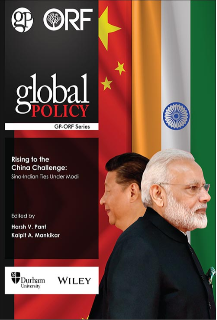
A quarter from year-end, here’s a coinage that has the potential to enter Merriam-Webster’s dictionary and become its Word of the Year 2023—“Geoshamitics”. The definition in 20 words: “Act or practice by one nation of using public shaming as an instrument to derive geopolitical advantage over another nation.” Primarily used to serve local political constituencies, geoshamitics is as much a tool of domestic distraction as it is an instrument of first-mover dominance. Often a cover for hiding crimes in the backyard of those indulging in it, geoshamitics is the weaponisation of stupidity. Using the deep state to power these narratives of shame, geoshamitics uses the ‘credibility’ of the media and think tanks to power the deception of its own government. The result: The impression of a nation as a weak and immature state.
Using the deep state to power these narratives of shame, geoshamitics uses the ‘credibility’ of the media and think tanks to power the deception of its own government.
Mostly, geoshamitics is the work of a childish leader harbouring illusions of grandeur. But, sometimes, it shows the racist underbellies of power. The shaming by one silly general becomes a focal point where formations of wolves, all brothers in arms, gather around that absurdity and get on with pack attack. The message is clear: This is the Wild White West, so all other “darkies” fall in line or else. The origin of the idea of geoshamitics is probably in the Cold War era when allegations rather than negotiations had become the tools of great power discourse. The lack of diplomatic channels of communication led to the rise of manipulating communication through fake narratives. Hurling allegations became the new medium. Note: Geoshamitics is different from releasing fake narratives. The latter is a game played by all nations and is now par for the course. The sole victims of fake narratives are individuals or media firms that lose credibility for a short while. Geoshamitics is more complex. It is the direct allegation made by a State—a spokesperson, a foreign minister, and in the rare occasion a head of government—on another State’s intent or action. The crudity of geoshamitics obscures the sophistication of diplomacy. Diplomacy is a mature and mostly invisible conversation. Two nations talk. They decide a course of action. If the meeting is public, as in and around the G20 deliberations, big points are taken and embedded in the readouts, while the core discussions continue beyond the event. When one leader breaches these conventions to seek support from a domestic constituency and makes his infantile thoughts public, it is geoshamitics.
The sole victims of fake narratives are individuals or media firms that lose credibility for a short while.
Although geoshamitics is generally the voice of the West, not all of it belongs there. Canadian Prime Minister Justin Trudeau’s rants against the Indian state are only the latest from that ilk. But closer to India, the Pakistani leadership—to which Canada and China have hyphenated themselves using terror against India as the hyphen—has been playing geoshamitics around Kashmir since 1947. North Korea, Iran, Russia and China routinely play mutual geoshamitics with the United States (US); China with countries around the South China Sea; China with Japan; China with Taiwan; the US with Cuba and Venezuela; Ukraine with Russia; Pakistan with Afghanistan…the list is long and is constantly evolving. The one thing binding all these plays is the absence of, or incredibly weak, diplomatic channels of communication. When diplomatic representations exist, they fulfil only the necessary criteria but remain insufficient to take conversations forward. It is a position of geopolitical stalemate. Amongst those where national interests are larger than national egos, geoshamitics goes hand-in-hand with on-ground evidence (the US and China or the European Union (EU) and Russia, for instance, where reports on technological intrusion by China’s Huawei or Russia’s interference in elections are used as evidence). Among friends, in the community of democracies and the comity of nations that value freedom, there is no place for geoshamitics. These are relationships, particularly among the trillion-dollar-plus democracies, that need to be strengthened against the rise of an alternative discourse of international roguery. That doesn’t mean there are not any problems. India has several issues with the US and the EU and is fixing them. It had tensions with Indonesia, which it has smoothened. It is raising the Australia relationship to a new high. Among non-democratic nations such as Saudi Arabia, India is working to clear the debris of Islamic terror financing. With Russia, it is engaging around its oil and arms interests. Even with an open enemy nation, China, India is standing tall on the border, but trade is still rising. Nowhere are the tensions around these negotiations made public. Geoshamitics is not India’s currency of attack—but once attacked, it will rely on all evidence to counter the allegations.
Among non-democratic nations such as Saudi Arabia, India is working to clear the debris of Islamic terror financing.
Because geoshamitics has worked well in the past for the West, the faith that it will work as successfully today or in the future displays a sublime ignorance of a changing geopolitics. As a collective, the West may still be the wealthiest group of nations. But it is beset with contradictions of its own making—self-destructive immigration policies, self-distractive shift of well-fed bellies to the tyranny of gender, self-depleting fertility rates, and a self-obsessed politics that has turned a glorious city like San Francisco into a hellhole. If geoshamitics is the sole currency of international discourse left with the West while engaging with countries such as India, the future is doomed. Wearing the smiling mask of rule of law and breaking the law in your terrorist-infested backyard will not work anymore. Wearing the shield of free speech to support hate speech by terrorists will not work either. If anything, it tells Indians that perhaps the response of Russia and China regarding the West—its hegemony, its dominance, its humiliating stance—is an accurate depiction of facts. Perhaps, this is a wake-up call. When the West is unable to manage its internal politics and seeks to buy votes by using geoshamitics as a discourse, it becomes a garbage bin for domestic political compulsions, which the rest of the world can see through clearly. The dichotomy between preaching values and following interests will not stand any longer. It is one thing to appease nasty terrorists and stay in power; it is quite another to ensure those terrorists do not turn their snake-like heads on the hand that feeds them. Pakistan is learning that lesson; Canada will too.
When the West is unable to manage its internal politics and seeks to buy votes by using geoshamitics as a discourse, it becomes a garbage bin for domestic political compulsions, which the rest of the world can see through clearly.
As the West weakens from within, geoshamitics and its poor cousin ‘shoot and scoot’ will continue to nip at the heels of nations such as India, which—despite them, their terrorist constituencies and their terror narratives—will continue to rise. Given the strong reaction, where not a single Indian constituent supports Ottawa, will Trudeau’s be the last case of geoshamitics? If the West has any sense left, it should. Otherwise, there are enough virtue-signalling, terrorist-supporting leaders willing to play geoshamitics. Until then, perhaps the Merriam-Webster’s dictionary can term it Word of the Year 2023.
Gautam Chikermane is Vice President at the Observer Research Foundation.
The views expressed above belong to the author(s). ORF research and analyses now available on Telegram! Click here to access our curated content — blogs, longforms and interviews.




 PREV
PREV


